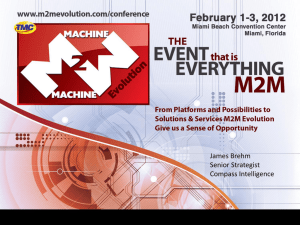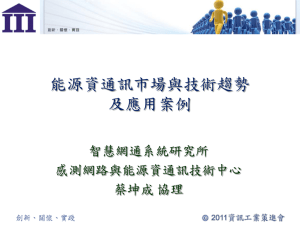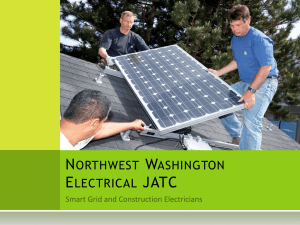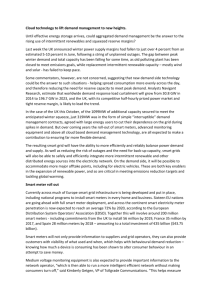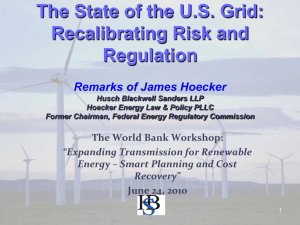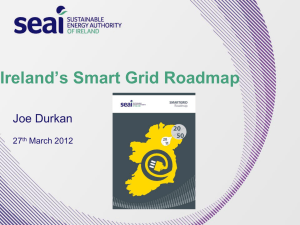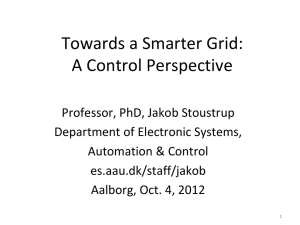Benefits of a Smart Grid
advertisement
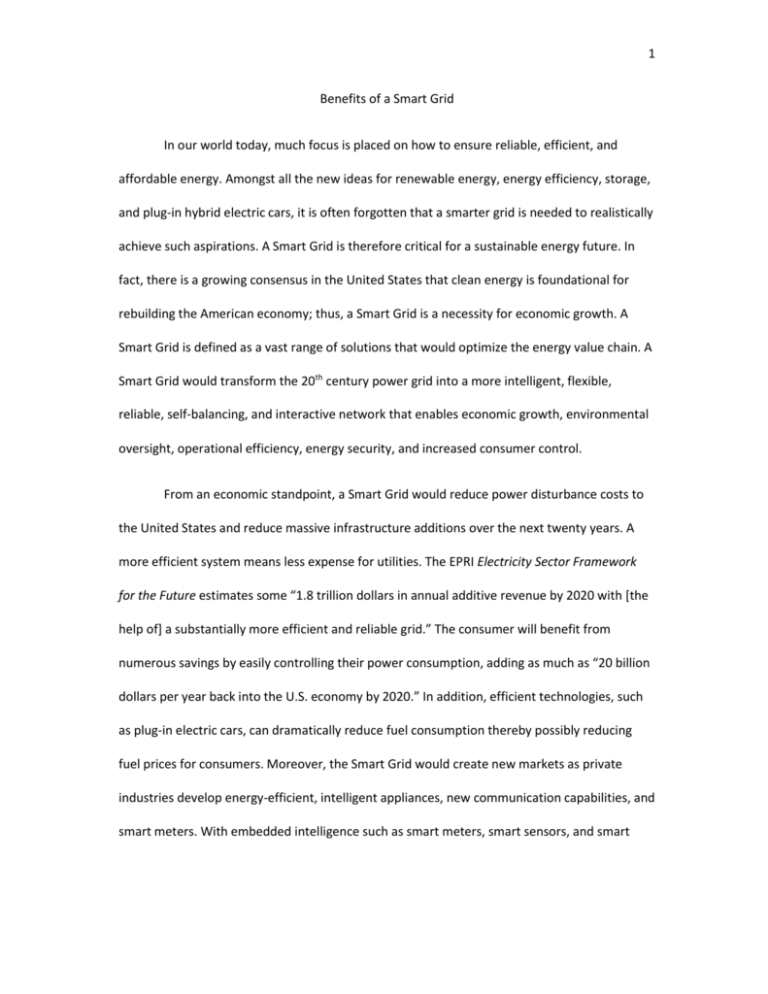
1 Benefits of a Smart Grid In our world today, much focus is placed on how to ensure reliable, efficient, and affordable energy. Amongst all the new ideas for renewable energy, energy efficiency, storage, and plug-in hybrid electric cars, it is often forgotten that a smarter grid is needed to realistically achieve such aspirations. A Smart Grid is therefore critical for a sustainable energy future. In fact, there is a growing consensus in the United States that clean energy is foundational for rebuilding the American economy; thus, a Smart Grid is a necessity for economic growth. A Smart Grid is defined as a vast range of solutions that would optimize the energy value chain. A Smart Grid would transform the 20th century power grid into a more intelligent, flexible, reliable, self-balancing, and interactive network that enables economic growth, environmental oversight, operational efficiency, energy security, and increased consumer control. From an economic standpoint, a Smart Grid would reduce power disturbance costs to the United States and reduce massive infrastructure additions over the next twenty years. A more efficient system means less expense for utilities. The EPRI Electricity Sector Framework for the Future estimates some “1.8 trillion dollars in annual additive revenue by 2020 with [the help of] a substantially more efficient and reliable grid.” The consumer will benefit from numerous savings by easily controlling their power consumption, adding as much as “20 billion dollars per year back into the U.S. economy by 2020.” In addition, efficient technologies, such as plug-in electric cars, can dramatically reduce fuel consumption thereby possibly reducing fuel prices for consumers. Moreover, the Smart Grid would create new markets as private industries develop energy-efficient, intelligent appliances, new communication capabilities, and smart meters. With embedded intelligence such as smart meters, smart sensors, and smart 2 control rooms, the Smart Grid will better serve electric consumers. Overall, benefits of the Smart Grid will greatly outweigh the costs. From an environmental standpoint, a Smart Grid would be able to replace traditional forms of energy with renewable sources of generation. Alternative forms of energy are always being sought by environmentalists in the hopes of developing cleaner, more efficient means of power generation. A Smart Grid would create environmental benefits by making the integration of plug-in hybrid vehicles more capable, and by distributing wind and solar energy sources with greater ease. Smart Grid offers a genuine path toward significant environmental improvement. In the push for Smart Grid updates, utilities are faced with the desire to enhance technology while at the same time maintaining the reliable and secure infrastructure that is necessary for serving their customers. Utilities must be open to the balance of replacement of technology with the practicality of Smart Grid upgrades. Smart Grid is accommodating, accepting energy from virtually any source. Smart Grids will create improved reliability for industries, which will result in increased savings. Our world is becoming more and more dependent on modern technology, and even the most minute disturbances in power quality and reliability could cause losses in information, operations, and productivity. A Smart Grid enables significant improvements in such power quality and reliability. The two-way communication characteristic of Smart Grids will allow utilities to identify, locate, and restore power outages more quickly without having to send crews on unnecessary trips. “In fact, a Smart Grid could eliminate up to 50% of trouble calls.” Smart Grids will also help reduce frequency and duration of trouble calls, resulting in more customer satisfaction and more peace for utility call centers. This grid will be “self-healing,” which means it will have the ability 3 to restore and prevent outages and extend the life of equipment. In a growing demand for electricity and power, nothing could be more important than finding reliable and quality electricity generation methods. By reducing peak demand, the Smart Grid could be used to reduce the need for additional transmission lines and power plants that would otherwise be needed to meet that electrical demand. The Smart Grid would be very effective at reducing operations and maintenance costs by reducing needless trips, and by sensing signs of equipment problems. Smart Grid technologies would be more adaptable to forms of renewable energy generation and would have the capacity to motivate changes in power flow. A Smart Grid would maintain the promise of enhanced reliability and security of the nation’s power system. New technologies and capabilities will be able to sense security issues to resist attacks and “provide real-time notification to cyber security organizations.” The Smart Grid is resistant to attacks and natural disasters as it is decentralized and reinforced with Smart Grid security protocols. The modern grid will also decrease foreign dependency by allowing the U.S. to create its own forms of clean, renewable energy. The Smart Grid will benefit consumers by means of reliability, price reduction, and availability of new products and services. The Modern Grid will provide more individual control over energy use and monthly bills to the residential and small commercial consumer. Smart Grid will provide new tools for consumers to manage their usage and total energy bills. They will be allowed to instantly see their electricity use and actively participate in electricity markets. Large customers will be able to access information including price signals to make efficient energy decisions. Local governments will benefit from higher reliability and lower duration of outages. This will reduce the burden on local fire, police, and other city resources that respond to events such as power outages or electrical problems. The grid will allow 4 operators to assist with emergency situations like storms and fires by turning off power selectively or by restoring power faster and more efficiently. A powerful, reliable energy source is greatly needed in America today. Recall for a moment, if you will, the ice storms and winter weather we experienced this January. In prevention of a total power outage across the state of Texas, electrical power was shut off for short periods of time. One morning when school was canceled, my brother and I woke up to a freezing house not knowing about the precautionary measures that were being taken by the State. My first thought was, “Oh no! We don’t have any power! We’re going to freeze!” Almost in a panic, I called my mom, and she told me that the power was off on purpose and that it would come back on shortly. I know it seems trivial to be scared about a fifteen minute power outage, but when you don’t understand what is going on, and you don’t know how long power will be out, such an experience is scary. I heard a story on the Dallas/Fort Worth news about an elderly woman who froze to death in her own home because she couldn’t afford the electricity needed to heat her house. Her small space heater was insufficient for such frigid temperatures. With the technology available today, Americans shouldn’t have to shut off power to prevent rolling blackouts. Electricity should be affordable and available to everyone. A reliable, efficient Smart Grid is the answer to such problems as these—problems that are fixable with a little bit of effort to change. America’s way of life depends on electricity. Because of our technological dependence, humans are using and producing more electricity than ever before. Our current grid is outdated and in need of a solution that will produce higher quality electricity while holding down costs. The Smart Grid delivers those results. In my opinion, the Smart Grid will enhance the capabilities of our current grid. The economical benefits of increased savings from reduced 5 power disturbances, the environmental benefits of cleaner power and more hope for renewable generation, utility benefits of increased operational efficiency and higher reliability, and improved national security and independence are all the reasons I believe a Smart Grid would be beneficial to the electric consumer. All across the globe, nations are turning to the Smart Grid to upgrade their aging electrical power systems. It’s time for America to step up and recognize the innumerable benefits.
